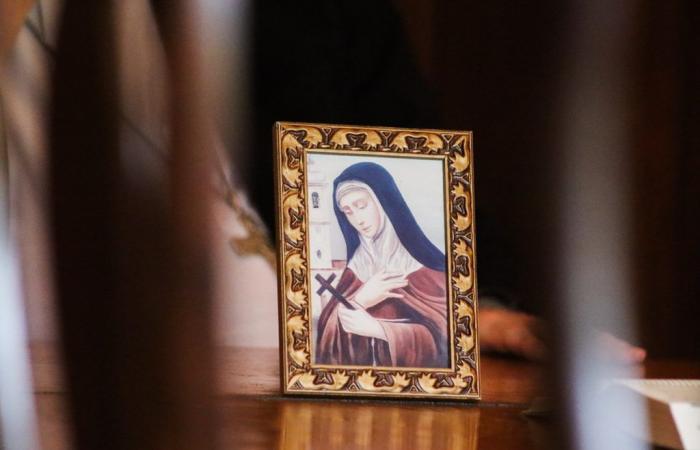
The first steps, taken in 2018, now continue with the constitution of a new Court, formed by the postulator of the Cause of the Servant of God, Friar Jociel Gomes; by Canon Alberto Montealegre, appointed Episcopal Delegate; by Father Laudimar Oliveira da Silva, appointed prosecutor; by the notary and the deputy notary, Dom Sebastião Rolim and Sister Violeta, respectively.
The meeting that formalized the resumption of work after the period of the Covid-19 pandemic took place at the episcopal residence, with the Archbishop of São Salvador da Bahia, Cardinal Dom Sergio da Rocha; and with the chancellor, canon Antonio Ademilton of Santa Bárbara.
The Court will review the testimonies and reports of graces achieved through the intercession of Clarissa who died with a reputation for holiness in 1715.
Also as part of these steps, the Historical Commission is working on the conclusive phase of preparing the report that will be delivered to the archbishop. The diocesan phase is also underway, which is expected to be completed in the second half of 2024.
With this conclusion, all documentation will be sent to the Dicastery of the Cause of Saints, in the Holy See, where the Roman phase will begin.
Mother Victoria of the Incarnation
According to reports, Mother Vitória da Encarnação had the gift of dreaming about people in need and then sending help to them. The nun was also sought after when the Sisters of the convent, who were cloistered, asked for help in finding lost objects.
Daughter of Bartolomeu Nabo Correia and Luísa Bixarxe, Mother Vitória da Encarnação was born in Salvador, on March 6, 1661 and was baptized in the same year in the old Cathedral of Bahia. The nun had a brother and three sisters. According to Dom Sebastião Monteiro da Vide (1720), the family house was an example of a Christian home.
In 1675, when the nun was 14 years old, her father wanted to send her, together with her older sister, Maria da Conceição, to a convent in the Azores, in Portugal. However, the girl refused and said that she would rather have her head cut off than be sent to a convent.
The first women’s convent in Brazil, Santa Clara do Desterro da Bahia, was founded in 1977. At this time, Vitória was 16 years old and had become averse to religion. The behavior worried her parents.
During this period, Father João de Paiva, a very pious Jesuit whom the people venerated as a saint, lived in Salvador and was reputed to be a prophet.
Vitória’s father asked the priest for help when he realized that his daughter had become averse to sacred things. He asked the priest to pray for her. The religious calmed him down and said that the girl would, in the future, be a great nun.
Years passed and Vitória began to have frequent dreams about the Mother of God and her Divine Son. The Virgin presented the Child to her and called her to the consecrated life. In other dreams, the nun saw the Divine Child picking flowers on the way to the convent and called her there.
The dreams repeated several times, but the teenager did not want to follow what the Virgin and Child asked.
Scary dream and consecration to God
In 1686, Victoria had a frightening dream and she found herself in the dirty, iodine-filled holds of a large vessel sailing on the high seas. She also found herself accompanied by merciless people who were heading towards perdition.
On top of the boat there were many happy religious people who were on their way to salvation. Vitória’s Guardian Angel explained that the navigators in the upper part did God’s will and were safe, while those in the hold, like her, were going to perdition.
After waking up from the dream, Vitória thought about her life and made the decision to consecrate herself to God and spend her life doing His will.
That same year, on September 29, the day of Saint Michael the Archangel, Vitória was welcomed into the novitiate of the Clarissa nuns of the Convento do Desterro da Bahia and, along with her, her sister, Maria da Conceição, was also welcomed. Mother received the religious name of Vitória da Incarnação.
According to his wish, he made his solemn profession on October 21, 1687, the day on which the feast of the Eleven Thousand Virgins was celebrated in the city of Salvador.
The nun lived entirely dedicated to the poor, sick and helpless who sought help from the monastery. She received the nickname “mother almsman” from the poor.
When she held the position of concierge, a large number of people went to the concierge to ask for assistance. She attended to everyone when she could and, even from within the cloister, recommended to her relatives to take care of those poor and sick who were in need.
Death of the ‘saint of Bahia’
After 29 years of seclusion and total consecration of her life to Christ and others, Vitória died on July 19, 1715, accompanied by the priest and the Sisters who attended her.
At the time of her death, the nuns said they felt a wonderful fragrance of roses filling the monastery’s premises.
When the news of Mother Victoria’s death spread, a large crowd gathered in front of the convent. The population said that the “saint of Bahia” had died.
The religious took scarves, medals, rosaries and other objects and asked the nuns to touch them on the “saint’s” body.
Miracles of Mother Victoria of the Incarnation
Several miracles were narrated by devotees shortly after the death of Mother Vitória da Encarnação. The then Archbishop of Bahia tried to question the nuns of Desterro about the life the nun had.
In 1720, just five years after her death, Dom Sebastião Monteiro da Vide published in Rome the biography of the “saint of Bahia” with the title “History of the Life and Death of Madre Soror Victória da Encarnação”. The zealous Jesuit Archbishop intended to request the opening his cause for beatification and even compared her to Saint Rose of Lima. However, he died in 1722.
Years later, with the Marquis of Pombal’s persecution of the Jesuits and the banning of many of their writings in Brazil, several books were lost. However, oral tradition made it possible to spread the story of Mother Vitória.
The religious remains are found in the Church of the Convent of Santa Clara do Desterro, in the neighborhood of Nazaré, in Salvador, and are deposited above one of the doors that connect the lower choir to the nave of the Church.
See more state news on g1 Bahia.





